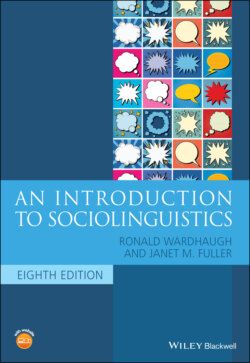Читать книгу An Introduction to Sociolinguistics - Ronald Wardhaugh, Janet M. Fuller - Страница 32
Exercises
Оглавление1 Look at the list of grammar rules below. Write an essay defending the use of one of these ‘incorrect’ grammatical constructions. Why do you think using these constructions is justifiable? Explain how the difference between these rules and natural speech demonstrates the difference between descriptive and prescriptive grammars. Prescriptive rules and examples:Never end a sentence with a preposition; use ‘whom’ instead of ‘who’ in object position. Example of a violation: Who did you give it to? (‘Correct’ speech: ‘To whom did you give it?’)Adverbs (words which modify a verb or adjective) should end in ‐ly (unless they are irregular, e.g., fast‐fast or good‐well). Examples of violations: Come quick! The house is on fire! (‘Correct’ speech: ‘come quickly’) That’s a real nice dress you’re wearing. (‘Correct’ speech: ‘really nice’) You read so slow! (‘Correct’ speech: ‘you read so slowly’)The verb ‘lie’ (past tense ‘lay’) means that something is in a prone position; the verb ‘lay’ (past tense ‘laid’) means that something is being put into a prone position. Examples of violations: It’s laying on the table. Just lie it down there.
2 Politically correct (PC) language. Below are some examples of so‐called PC language. Think about why these terms have been suggested, which ones have been widely adopted, and what attitudes exist toward some of these linguistic terms. What beliefs about the relationship between language and culture are reflected in the suggestion and adoption of or resistance to PC language?Firefighter (formerly ‘fireman’)Police officer (formerly ‘policeman’)People of color (formerly ‘non‐white’)Differently abled (formerly ‘disabled’)Homemaker (formerly ‘housewife’)Native Americans (formerly ‘[American] Indian’ or ‘Red Indians’)Happy Holidays (instead of ‘Merry Christmas’)
3 Language and culture: Covid terms. Below is a list of expressions used during the time of Covid‐19. Discuss how these words construct cultural norms of the time as well as illustrate linguistic creativity.‘Quarantini’: it’s a regular martini but you drink it alone at home‘Zoomtail’: similar to quarantini, except that you do it on Zoom‘Covidiot’: someone who blatantly violates social distances/hygiene protocol‘The Rona’: short version of Coronavirus‘Zoom‐ba’: same as Zumba, but on Zoom‘Zate’: Zoom + date (a date or meetup on Zoom)‘Quaran‐tan’: tanning while quarantined‘Quaranteens’: babies conceived during a quarantine, who will be teens by 2033‘Quarantime’: the era of the Covid‐19 restrictions‘Coviduation’: you may graduate but won’t participate in a graduation ceremony‘Zumping’: getting dumped on Zoom
4 Communicative competence. Look at the following joke about British sayings and what they really mean. Discuss how this depiction of cross‐cultural miscommunication illustrates the concept of communicative competence.WHAT THE BRITISH SAYWHAT THE BRITISH MEANWHAT FOREIGNERS UNDERSTANDI hear what you sayI disagree and do not want to discuss it furtherHe accepts my point of viewWith the greatest respectYou are an idiotHe is listening to meThat’s not badThat’s goodThat’s poorThat is a very brave proposalYou are insaneHe thinks I have courageQuite goodA bit disappointingQuite goodI would suggestDo it or be prepared to justify yourselfThink about the idea, but do what you likeOh, incidentally/by the wayThe primary purpose of our discussion isThat is not very importantI was a bit disappointed thatI am annoyed thatIt doesn’t really matterVery interestingThat is clearly nonsenseThey are impressedI’ll bear it in mindI’ve forgotten it alreadyThey will probably do itI’m sure it’s my faultIt’s your faultWhy do they think it was their fault?You must come for dinnerIt’s not an invitation, I’m just being politeI will get an invitation soonI almost agreeI don’t agree at allHe’s not far from agreementI only have a few minor commentsPlease rewrite completelyHe has found a few typosCould we consider some other optionsI don’t like your ideaThey have not yet decidedSource: Translation table explaining the truth behind British politeness becomes internet hit, by Alice Philipson, The Telegraph, September 1, 2013. © 2013, Telegraph Media Group Limited.
